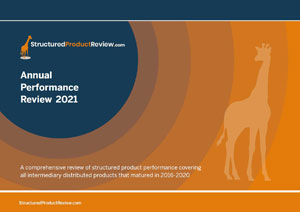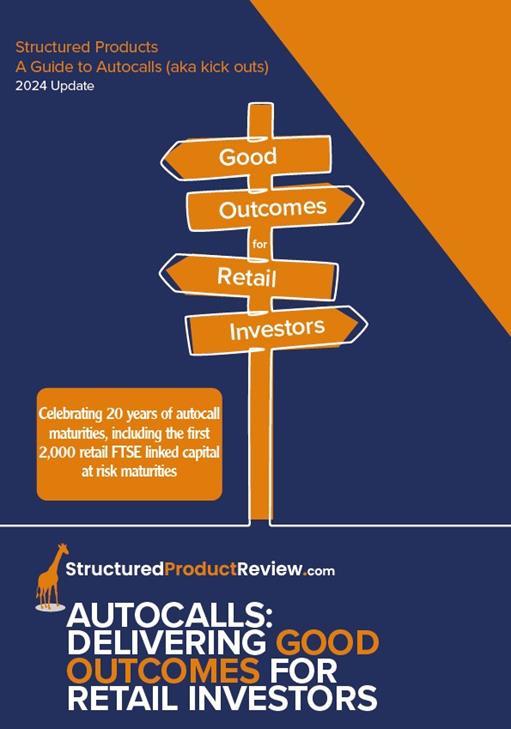27/03/2024
The following article was written by Clive Moore, Managing Director, iDAD.
For someone who has spent a large part of the last 32 years developing structured products, I remain consistently wary in my assessment of them and how they are used. Thankfully, the UK market practice in this area has moved on massively from the over-exuberance of the late 1990s and early 2000s, when Scottish Widows and others were pumping out ill-considered, exceptionally risky and poor value products. The capital at risk market is dominated by generally cautious variants on a proven theme – Autocalls, or ‘Kick-out’ products first appeared in the UK in 2003 and have delivered exceptionally strong returns for investors ever since.
|
July 2003 - July 2023 |
Initial Investment £10,000 |
|
Rolling Kick-Out Strategy |
Roughly £50,000 |
|
FTSE 100 Total Return |
Roughly £37,000 |
*Source FTSE and IDAD (using Structured Product Review Database)
The market is competitive with lots of offerings backed by large banks, most of whom are classed as Systemically Important, meaning they have the backing of central banks and bail out mechanisms if needed. Advisers have access to excellent research from Structured Edge (FVC) – www.structurededge.co.uk and Structured Product Review – www.StructuredProductReview.com and more modern investment platforms make it easy to incorporate products into client portfolios.
Rule 1 – Don’t Lose Clients Money
Rule 2 – See Rule 1!
The ‘normalisation’ of interest rates (I’m comfortably over the age of 35, so 3-5% base rates look pretty good to me) in the last 18 months has led to even more attractive capital protected opportunities for investors and advisers. Lots of investors keep money in bank and building society accounts because their primary objective is simply not to lose their hard-earned savings – they’re more worried about return of capital rather than return on capital. If you’re reading this, you’re probably aware of the frustration felt by clients when bond valuations collapsed as interest rates rose, leading to very poor performance by traditional lower-risk portfolios.
Structured deposits were popularised by Investec, a relatively small South African bank who realised that their own financial strength was relatively unimportant thanks to the Financial Services Compensation Scheme (FSCS) which covers deposits of up to £85,000 per person per institution. There are typically deposit offerings available from 2-5 different issuing banks, which gives most investors quite a lot of headroom before their money needs to fall outside the FSCS umbrella.
The products are generally pretty easy for investors to understand and tend to have 5 or 6 year terms. The best comparison is with a fixed rate bond from a bank or Building Society, but rather than getting a rate of 4-4.5% p.a. from a bank they’ve never heard of, investors can ‘risk’ their interest (but not their capital) to achieve returns of 5-8% per annum. The ability to achieve higher returns with no risk to capital makes sense for a lot of investors, and it’s pretty easy for them to grasp the concept of higher-return products being less likely to deliver the return than lower-return products.
How do they do it?
For the banks issuing structured deposits, delivering the returns is as straightforward as on a fixed rate bond. The cash they raise goes to their balance sheet and is used to lend to borrowers and, in the case of a structured product, some is used to buy exposure (usually through the use of futures contracts) to the underlying asset that will determine the investors’ returns.
|
Product Type |
Liability |
Asset |
|
Fixed Rate Bond |
Bank pays depositor 4% p.a. |
Bank lends money at 6% p.a. |
|
Structured Deposit |
Bank pays 100% of FTSE 100 |
Bank hedges FTSE 100 |
Banks are pretty efficient at this, but even if they aren’t, all that matters to investors is that they have a ‘contract’ with the bank that says what they’ll get back. It’s actually irrelevant whether the bank hedges against their liability accurately or not – they just need to remain solvent for investors to get the returns, and if they don’t the FSCS will ride to the rescue.
Time to Fight Back
Even the largest adviser firms in the UK have lost significant amounts of money from platforms/influence as investors have flocked to the Bank and Building Society tempted by high interest rates – it’s very difficult to compete with rates higher than the target return (before charges) on a cautious portfolio or fund, especially when recent performance has been so poor. Structured deposits encourage investors back to the warm embrace and professional expertise of their financial adviser because of the protection they offer (it’s return of capital remember). The charges on these products are low (typically a one-off 1-2% covering all fees and custody costs) and won’t affect the annual fee-stack clients pore over.
It's often better at an annual review to present solutions to the problems clients have faced, rather than just to reassure them that the same approach that has failed in the past will start working now (even if it probably will).
The Liquidity Myth
Structured products are designed to meet a specific need, typically low-risk/no-risk growth or income opportunities over the medium term. They should be held for the term to maturity and they will generally deliver the best outcome if this is the case. Nevertheless, life has a tendency to be unpredictable and funds may be needed before the product matures. It is easy for investors to make withdrawals from investments earlier if they need to, products are priced daily (some as often as twice a minute) and banks buy the investments back all the time. In fact withdrawing earlier from a structured product is generally much simpler than from a traditional fixed-rate bond.
What About the PI Costs?
If advisers use structured products where clients can lose money, known sometimes as SCARPs (Structured Capital At Risk Products) in client portfolios, PI insurers used to take an interest and ask for higher potential excess payments on claims. But for structured deposits this isn’t the case and almost all advisers will have ‘Structured Deposit’ as an instrument they can advise on as part of their FCA permissions. If not, it’s easy to add.
CIP Friendly Option
There are also quite a few funds of structured products available across multiple platforms that can deliver steady returns for portfolio managers and advisers. Some even have the capacity to take in specie transfers – ideal if you’re taking on clients with structured products that don’t match a Central Investment Proposition.
Hero or Villain
Not all structured products are perfect but they can and do deliver returns that match investor requirements precisely. Right now, they can be pretty useful for advisers too.
IDAD Limited is authorised and regulated by the Financial Conduct Authority FCA FRN 740499. It is a limited liability company registered in England and Wales number 4521366.
Past performance is not necessarily a guide for the future.
Structured investments put capital at risk.
Also in this section
- How old is too old? Are structured products to die for?
- Product focus - October 2024
- Q3 2024 Issuance
- Q3 2024 maturity results
- A share of spread bets on steroids?
- Product focus - September 2024
- Maturities of the month - August 2024
- Right on time
- Product focus - August 2024
- Keep calm and zoom out
- 2,000 and counting
- Q2 2024 maturity results
- 20 years of autocall maturities
- Product focus - June 2024
- Fixed income or interest?
- Maturities of the month - May 2024
- The barrier debate - revisited
- Product focus - April 2024
- Maturities of the month - April 2024
- Time to call
- I don't believe markets are ever too high for Structured products!
- Notes on counterparty exposure
- Return of Nikkei
- Q1 2024 issuance
- Q1 2024 maturity results
- Structured Products – AAAAAGH!
- Hop in CIBC
- Re-enter Santander
- How to build a financial fortune - revisited
- Issuance in 2023
- Where's the risk?
- Questionable offerings
- Challenging the case against structured products - 'Loss of dividends'
- Navigating the investment landscape
- Challenging the case against structured products - Counterparty risk
- 6-year autocalls approaching final destination
- 1,750 FTSE capital at risk autocall maturities
- The leopard that changed her spots
- Q3 2023
- Challenging the case against structured products - Keydata
- Dilemmas for UK IFA's and the unique role of Structured Products
- 'High charges'
- Precipice bonds
- Intro
- FTSE 100 Contingent Income
- Indexing the indices
- Something different
- Investing through volatility
- 100 10:10s
- The best or worst?
- The 10%/25% 'Rule' that never was
- Structured products and the yield curve
- Fixed income: Capital at risk?
- Prospects for UK inflation - and fun with A.I!
- The Barrier Debate
- More Deposits for now
- Last of the Americans
- What if?
- Time heals all wounds, we hope...
- How to diversify portfolios using structured products?
- The Proof Is In The Pudding...
- Debunking Structured Misconceptions
- 1,500 FTSE Capital-at-Risk Autocall Maturities
- Q3 2022 Maturity Results
- What do we prefer?
- Deposits vs Capital ‘Protected’
- There’s time yet…
- Where did you invest your clients?
- A Six-Month Reflection
- Return of the Rev Con
- Happy 2nd Birthday FTSE CSDI
- Q2 2022 Maturity Results
- The best and worst yet still the best
- Critique my Suitability - Mariana 10:10 Plan June 2022 (Option 2)
- 10/10 for 55 10:10’s
- Q1 2022 Maturity Results
- 'How to build a financial fortune': a follow up
- Critique my Suitability - Mariana 10:10 Plan April 2022 (Option 2)
- 2021 Capital-at-Risk Autocall Maturity Review
- An unwelcome return...
- CSDI's First Birthday
- Bon Anniversaire
- Introducing the FTSE Custom 100 Synthetic 3.5% Fixed Dividend Index
- Q3 2021 Maturity Results
- Critique my Suitability - Mariana 10:10 Plan October 2021 (Option 2)
- Blurring the lines...
- Beware of false knowledge; it is more dangerous than ignorance
- Good news, bad news...
- Certainty is Certainly a Benefit
- Critique my Suitability - Mariana 10:10 Plan September 2021 (Option 2)
- A Twenty-Year Progression
- Q2 2021 Maturity Results
- Nine 8:8s Post Positive Returns in Falling Markets
- Critique my Suitability
- Q1 2021 Maturity Results
- Morgan Stanley’s Marvelous Maturity Medley
Current Products
We review the UK's retail structured investment sector, providing pertinent support for Professional Advisers and relevant research tools.
View all ⟶


